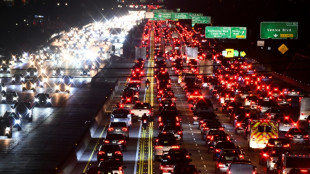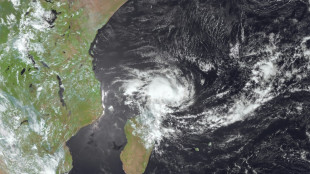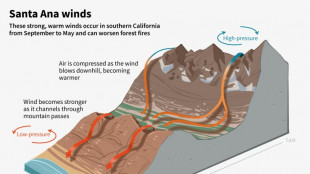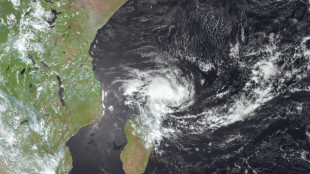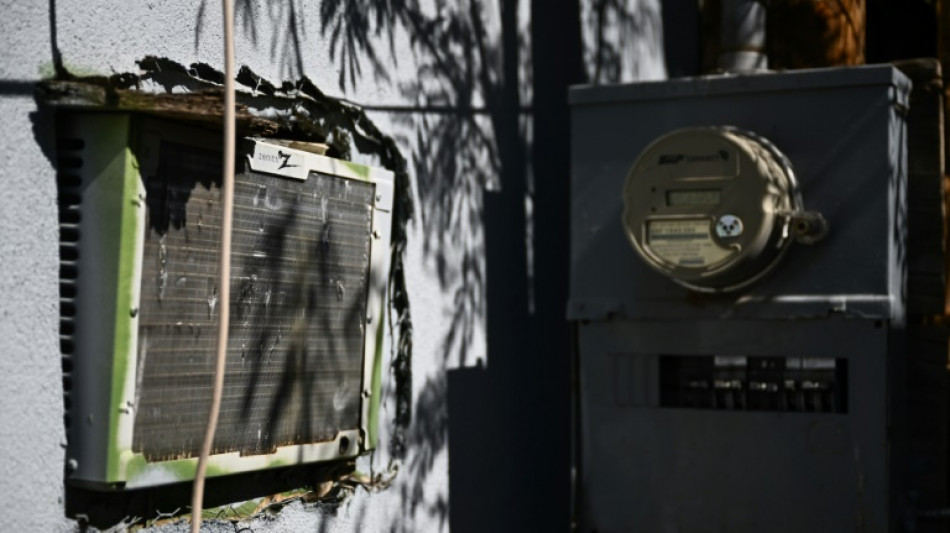
-
 Schareina wins penultimate bike stage but Sanders on course for Dakar victory
Schareina wins penultimate bike stage but Sanders on course for Dakar victory
-
Pope Francis bruises arm in fall at Vatican
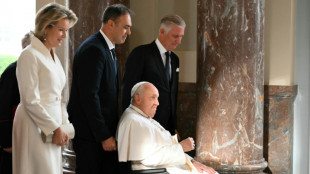
-
 Arsenal optimistic in Premier League title race: Raya
Arsenal optimistic in Premier League title race: Raya
-
EU announces 120 mn euros in Gaza aid after ceasefire

-
 Patients dying in corridors as UK hospital standards 'collapse': report
Patients dying in corridors as UK hospital standards 'collapse': report
-
Sinner roars back in Melbourne as Swiatek sets up Raducanu clash

-
 'Nervous' teen star Fonseca out of Australian Open after thriller
'Nervous' teen star Fonseca out of Australian Open after thriller
-
Nepal's top court bars infrastructure in protected areas

-
 Stock markets jump as inflation worries ease
Stock markets jump as inflation worries ease
-
Sinner drops rare set en route to Australian Open third round

-
 China to probe US chips over dumping, subsidies
China to probe US chips over dumping, subsidies
-
Israel accuses Hamas of backtracking on fragile ceasefire deal

-
 Chinese apps including TikTok hit by privacy complaints in Europe
Chinese apps including TikTok hit by privacy complaints in Europe
-
Blasts in Kyiv as UK's Starmer visits to ink '100-year' accord

-
 Hong Kong mogul Jimmy Lai grilled over US, Taiwan ties
Hong Kong mogul Jimmy Lai grilled over US, Taiwan ties
-
Pakistan, West Indies seek to improve from Test Championship lows

-
 Trauma and tragedy in the City of Angels: covering the LA fires
Trauma and tragedy in the City of Angels: covering the LA fires
-
Spain raises flag at Damascus embassy after 12-year closure

-
 Teen star Fonseca out of Australian Open in five-set thriller
Teen star Fonseca out of Australian Open in five-set thriller
-
Travel agencies say North Korea reopens border city to tourism

-
 India's outcast toilet cleaners keeping Hindu festival going
India's outcast toilet cleaners keeping Hindu festival going
-
Apple loses top spot in China smartphone sales to local rivals

-
 Sri Lanka signs landmark $3.7 bn deal with Chinese state oil giant
Sri Lanka signs landmark $3.7 bn deal with Chinese state oil giant
-
'I had 10 minutes': Lys makes most of Australian Open second chance

-
 Spanish FM raises flag at Damascus embassy after 12-year closure
Spanish FM raises flag at Damascus embassy after 12-year closure
-
Blue Origin's New Glenn rocket blasts into orbit for first time

-
 UK economy rebounds but headwinds remain for govt
UK economy rebounds but headwinds remain for govt
-
Rice fields turned into art in northern Thailand

-
 Stocks follow Wall St higher on welcome US inflation data
Stocks follow Wall St higher on welcome US inflation data
-
South Korea's president arrest: what happens next?

-
 Blue Origin's New Glenn rocket blasts off in first launch, reaches orbit
Blue Origin's New Glenn rocket blasts off in first launch, reaches orbit
-
Chinese give guarded welcome to spending subsidies

-
 World Bank plans $20 bn payout for Pakistan over coming decade
World Bank plans $20 bn payout for Pakistan over coming decade
-
Indian Bollywood star Saif Ali Khan stabbed in burglary

-
 Taiwan's TSMC says net profit rose 57% in fourth quarter
Taiwan's TSMC says net profit rose 57% in fourth quarter
-
India achieves 'historic' space docking mission
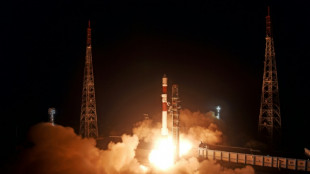
-
 South Korea's Yoon avoids fresh questioning after dramatic arrest
South Korea's Yoon avoids fresh questioning after dramatic arrest
-
Olympic push for kho kho, India's ancient tag sport

-
 Dangerous Fritz sets up Monfils clash at Australian Open
Dangerous Fritz sets up Monfils clash at Australian Open
-
AFP photographer's search for his mother in the Nazi camps

-
 Life after the unthinkable: Shoah survivors who began again in Israel
Life after the unthinkable: Shoah survivors who began again in Israel
-
Israeli cabinet to vote on Gaza ceasefire deal

-
 Jabeur finds it 'hard to breathe' as asthma flares up in Melbourne
Jabeur finds it 'hard to breathe' as asthma flares up in Melbourne
-
Swiatek powers on as Sinner, Medevedev top men's Melbourne bill

-
 Nintendo rumour mill in overdrive over new Switch
Nintendo rumour mill in overdrive over new Switch
-
Biden warns of Trump 'oligarchy' in dark farewell speech

-
 Superb Swiatek sets up Raducanu showdown at Australian Open
Superb Swiatek sets up Raducanu showdown at Australian Open
-
Asian stocks follow Wall St higher on welcome US inflation data

-
 Toyota arm Hino makes deal to settle emission fraud case
Toyota arm Hino makes deal to settle emission fraud case
-
Fire-wrecked Los Angeles gets a break as winds drop


In a warming world, is an air-conditioned future inevitable?
They are ubiquitous in the United States, controversial in Europe and coveted in South Asia. As heatwaves intensify across the world, air conditioning has taken center stage.
For better or for worse, these power-hungry appliances are among the most common adaptations to a warming world. They have become a necessary tool for the survival of millions, according to experts.
But while they bring immediate, life-saving relief, air conditioners come at a cost to the climate crisis because of their enormous energy requirements.
Air conditioning is responsible for the emission of approximately one billion metric tons of carbon dioxide per year, according to the International Energy Agency (IEA), out of a total of 37 billion emitted worldwide.
It is possible to end this vicious cycle, experts say, by increasing the contribution of renewable energies, developing less energy-intensive air conditioners and augmenting them with other cooling techniques.
"There are some real purists who think that we can eliminate, but I just don't think that's feasible," Robert Dubrow, a Yale epidemiologist who specializes in the health effects of climate change, told AFP.
Access to air conditioning already saves tens of thousands of lives a year, a figure that is growing, according to a recent IEA report co-authored by Dubrow.
Studies show that the risk of heat-related death is reduced by about three-quarters for those living in homes with an air conditioner.
In the United States, where about 90 percent of households have AC, studies have highlighted the role of air conditioning in protecting the population -- and the potentially devastating effect of widespread power cuts during heatwaves.
But globally, of the 3.5 billion people living in hot climates, only about 15 percent have air conditioners at home.
- High costs, high emissions -
The number of air conditioners in the world, about two billion today, is set to skyrocket as temperatures and incomes rise.
India, China and Indonesia -- the first, second and fourth most populous countries in the world -- are among those that will see the strongest growth.
By 2050, the share of households in India equipped with air conditioners could increase from 10 to 40 percent, according to a recent study.
But such an increase in electricity consumption would be equivalent to the current total annual production of a country like Norway.
If India's future grid uses as much fossil fuels as it does today, that would mean around 120 million tons more carbon dioxide emitted annually -- or 15 percent of the country's current energy sector emissions.
The problems posed by increased air conditioning do not stop there. Running power plants also causes air pollution.
Air conditioners also generally use fluorocarbon gases as refrigerants, which have a warming power thousands of times greater than CO2 when they escape into the atmosphere.
And by discharging their hot air out into the streets, air conditioning contributes to urban heat island effects.
A 2014 study found that at night heat emitted from air-conditioning systems in city centers increased the mean air temperature by more than 1 degree Celsius (almost 2F).
Finally, due to its cost, access to air conditioning poses a major equity issue.
Once installed, the price of the electricity bill can force families to choose between cooling and other essential needs.
- 'Complementary' solutions -
For Enrica De Cian, a professor in environmental economics at Ca Foscari University in Venice, the use of AC is "an important strategy in certain conditions and in certain places."
But, she adds, it's essential to combine it with "complementary" approaches.
First, by continuing to ramp up renewable energy production, and wind down fossil fuels, so that energy used by air conditioners leads to fewer emissions.
Second, by developing and installing affordable air conditioners that consume less energy, which some companies are working on. The IEA advocates for stricter efficiency standards, but also recommends air conditioners to be set at a minimum of 24C (75F).
Beyond limiting emissions, greater efficiency would also curb the risks of power cuts linked to excessive demand. On hot days, air conditioning can account for more than half of peak consumption.
But above all, the experts hammer home the simultaneous need for spatial planning measures: including more green spaces and bodies of water, sidewalks and roofs that reflect the Sun's rays, and better building insulation.
"We have to achieve sustainable indoor cooling," said Dubrow.
The proposed solutions are "very feasible," he adds. "It's a matter of political will for them to be implemented."
M.A.Colin--AMWN
